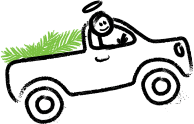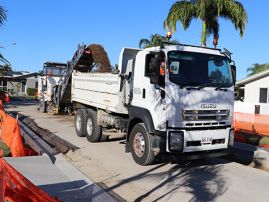Let's Get it Sorted
Recycling is one of the easiest ways to keep material out of landfill.
Townsville residents recycle approximately 15,000 tonnes of household packaging materials every year – this is great work! Despite this, our bin health checks across Townsville have shown that each year we are still sending more than 10,000 tonnes of recyclable material to landfill through our general waste bins.
It’s time to look at how we can work together to keep improving our recycling efforts and recovering these valuable materials.
As well as understanding what can and can't be recycled, we ask that your recyclables are free from food and other contaminants, never bagged, and free from broken glass or other hazardous materials.
Recycling Tips
Check out the tips below to help you recycle right!
Keep it Simple
Only recycle the following in your yellow lid recycling bin:
- glass bottles and jars
- hard plastic bottles and containers
- paper and cardboard
- steel and aluminium cans.
Keep it Loose
Place your recyclables loose in your recycling bin so they can be sorted:
- don’t bag your recyclables
- don't put your recyclables in a box.
Keep Out Soft Plastics
Keep the following items out of your yellow lid recycling bin:
- all soft plastics (including bags, plastic wrapping, chip packets and bread bags)
- degradable or biodegradable plastic bags (these belong in your general waste bin).
Keep it Safe
Keep hazardous items that could harm workers or damage machinery out of your yellow lid recycling bin, including:
- broken glass
- building materials
- chemicals
- netting
- sharps and needles
- wires and electrical cables.
Keep it Clean
Rinse or wipe out containers that have food or drink in them.
Keep the following items out of your yellow lid recycling bin:
- fabric
- food scraps
- general waste
- nappies
- soiled paper or cardboard.
Keep out Small Items
Don’t place anything smaller than a credit card into your yellow lid recycling bin, including:
- bottle lids and caps
- bread tags
- plastic and paper clothing tags.
These items slip through our recycling equipment so put them in your general waste bin instead.
More Recycling Information
What Happens to your Recycling?
All recyclables collected in Townsville are taken to our Materials Recovery Facility (MRF) where they go through a sorting process that separates products into their different material groups (such as cardboard, plastics, and deodorant cans).
Once sorted, the product is then baled and transported via rail to south-east Queensland where it goes through a physical recycling process and is transformed into new products.
Items such as plastic bottles and containers can be recycled into:
- car bumper bars
- clothing and carpet material
- kids play equipment
- new bottles and containers
- plastic chairs and decking.
Paper and cardboard can be recycled up to 10 times until the paper fibres become too brittle to turn into new paper and cardboard product. Once paper reaches this stage it is simply turned into items like tissues and toilet paper which we throw away or flush down the toilet.
Glass, steel and aluminium are infinitely recyclable. This means they can be recycled over and over, forever.
- Glass can be made back into new glass bottles and jars, or used to make ceramic tiles, cement, paint additives even road base and bedding for new pipes and construction works.
- Steel and aluminium can be smelted into new cans and bottles, but also used in car parts, tools, bicycles and fences.
Recycling reduces our reliance on extracting natural resources from our environment and keeps materials in use for as long as possible.
Recycling at Home
In 2022, Townsville City Council conducted a waste and recycling characterisation audit of kerbside bins across Townsville. These audits provide valuable information about our resident’s waste and recycling habits and where we can improve.
The main findings from our recent audit showed:
- Residents on average produce 14.73kg per week of general waste and 7.34kg per fortnight of recycling.
- Recyclable material makes up approximately 13.9% of our general waste bins with
- Compostable organics, including food and garden organics, makes up 52.4%
- Our kerbside recycling bins contain about 27% contamination of waste materials that should be placed in the red or green lidded waste bin. Common waste items incorrectly placed in the recycle bin include garden organics, food scraps, bags of general rubbish and nappies, soft plastics, sharps, donation items such as clothing and toys, and electrical goods.
- There is more than $2.5 million worth of 10 cent refundable bottles and cans being disposed of in our kerbside bins each year. This is money that could be going directly back to our community!
Green Waste
 It's free to throw your green waste all year-round!
It's free to throw your green waste all year-round!
Find out more information on our Household Waste Services and Transfer Stations and Landfill pages.
Recycling at Work
Recycling at work is as simple as recycling at home.
Our resource recovery education officer can conduct toolbox talks with your workplace to dispel some of those myths about recycling in Townsville, and answer any questions you or your staff may have. For more information on these talks please contact our Customer Service Centre and attention your correspondence to the resource recovery education officer.
Recycling Factsheets
Learn fast facts about recycling and download the factsheets below:
- Common Recycling Myths & Misconceptions (PDF)
- DIY Composting - How to Compost (PDF)
- DIY Worm Tubes - The Facts about Worm Tubes (PDF)
- Recycling at Home (PDF)
- Recycling glass factsheet (PDF)
- Recycling paper and cardboard factsheet (PDF)
- Recycling steel and aluminium factsheet (PDF)
- Recycling plastic factsheet (PDF)
- Waste and Recycling Quick Guide (PDF)
More Information
For more information on recycling and keeping our country clean visit these websites:
- Battery World's national recycling program
- Cool Australia
- Mobile Muster
- Planet Ark
- Waste page of the Queensland Government website
Or visit our Waste and Recycling page for more information about waste and recycling service.





